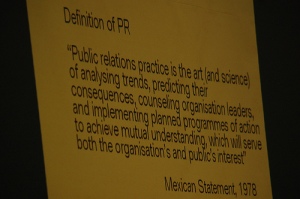I’ve seen a lot of posts going around about social media in 2009, specifically ones from Brian Solis, Shannon Paul and Todd Defren. Check them out – those are some pretty solid posts. So in anticipation of the new year, I wanted to write about what I think is going on in public relations in 2009 – challenges, obstacles, what’s working and what needs to change.
From my perspective, here are some of the buzzwords within the industry for 2009:
Diversity of the industry
I see diversity as more than solely differences in gender, race and ethnicity. To me, diversity is just different kinds of people. In public (or people) relations, it’s important to keep in mind that when you are reacing out to a large audience, chances are that audience will be very diverse. Learning how to reach out to different kinds of people is key to successful public relations outreach.
Another point of interest – I was listening to a recent PRSA diversity podcast and heard a great discussion on the future of diversity in public relations. I discovered that 90 percent of PRSSA members are female – HOLY COW. The industry is definitely dominated by females, but it seems as though this gender gap will only widen. While I have my own theories why this is happening (hint: some of my friends call me a party planner.. yuck), it’s something that the industry needs to pay attention to. Also,
You can check out the PRSA Diversity Today podcasts here. They are full of great information.
New standards in PR education
Because public relations is a constantly changing industry, PR education needs to be constantly changing, too. I’m lucky to have a solid curriculum at MSU – we have a strong balance of PR academics and PR professionals teaching courses that are generally relevant and topical.
I think combining theory with practical experience is the name of the game for successful PR education. Last semester, I took a journalism class on writing for the media. It was a really great class because touched on some history and communication models in addition to working on a press kit for a Lansing-based non-profit. It gave the students the opportunity to build their portfolio right in class.

Is PR Social Media?
I’ll be honest – I don’t have an answer for you. And I don’t think that the answer is black or white. But I will say that knowledge and understanding of social media is becoming more and more important for the public relations student. It’s also becoming expected, too. One thing that us students sometimes forget is that we really do need to know the basics of PR, too. Solid writing skills, understanding business principles and office etiquette will still trump having 10,000 followers on Twitter – at least in 2009. We’ll see what 2010 has to offer.
Ethics for you and me
I think 2008 was a year of dishonesty and unethical behavior. Whether it’s the Madoff scandal or the Blagojevich drama or the Wall Street CEOs and their ridiculous bonuses; it hasn’t been a pretty year. I’m hopeful that corporations have learned to be honest, ethical and transparent – 2009 will be the year to show it. Now more then ever, public relations professionals are relied upon to build that trust. Mike Cherenson from PRSA talks about how important this will be for the professional in a PR Tactics article.
Advocacy for itself
Public relations professional often get tied up with client work that the industry often forgets to advocate for itself. We need to hold our colleagues and clients accountable to high ethical standards and make sure that the rest of the world knows we’re doing it.
The new wave of professionals
My fellow public relations students are tenacious, curious and dedicated. But as I previously mentioned, we need to remember the PR fundamentals, too. The future of the public relations industry, as I see it, balances old habits with new techniques. We can’t get too caught up in the blogosphere – we still have to go to class, right?
Call me an optimist, but I’m really excited for what 2009 has to offer the PR industry and PR professionals. While there are some challenges ahead, there is much to accomplish, too.
What else am I missing? Where do you see public relations going in 2009? Are you as optimistic as I am?
Photo by Rasso on Flickr.
Filed under: Uncategorized, 2009 predictions, advocacy, brian solis, diversity, ethics, mike cherenson, prsa, PRSSA, Public Relations, shannon paul, Social Media, students, todd defren









Recent Comments